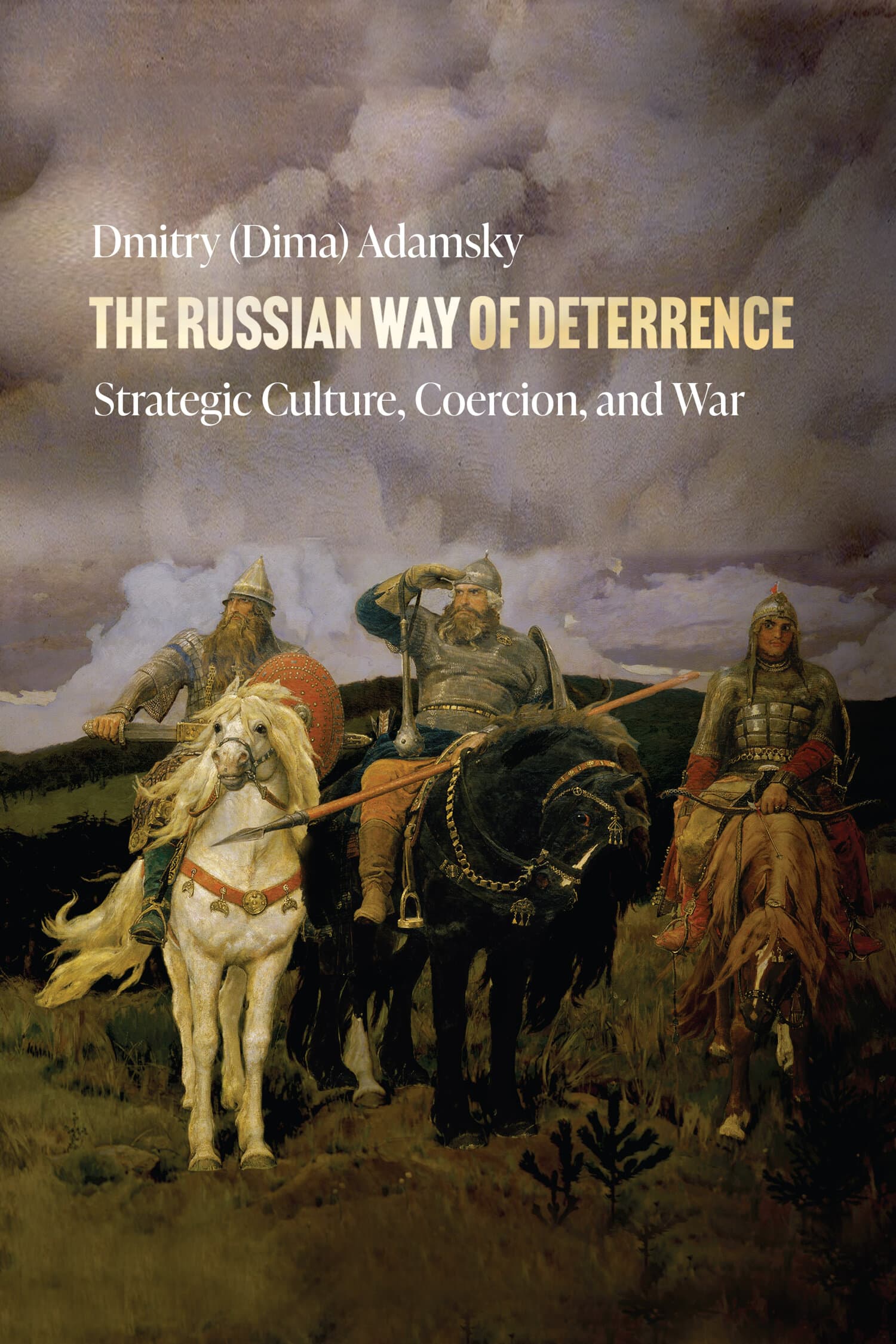The Russian Way of Deterrence
Award Winner
2024: Foreign Affairs Best Book of the Year
Named a 2024 Best Book of the Year (Military and Science and Technological Category) by Foreign Affairs.2024: Book of the Year
Named a 2024 Book of the Year by Engelsberg Ideas.

Selected among Foreign Affairs's "Best of Books 2024"
From a globally renowned expert on Russian military strategy and national security, The Russian Way of Deterrence investigates Russia's approach to coercion (both deterrence and compellence), comparing and contrasting it with the Western conceptualization of this strategy. Strategic deterrence, or what Dmitry (Dima) Adamsky calls deterrence à la Russe, is one of the main tools of Russian statecraft. Adamsky deftly describes the genealogy of the Russian approach to coercion and highlights the cultural, ideational, and historical factors that have shaped it in the nuclear, conventional, and informational domains. Drawing on extensive research on Russian strategic culture, Adamsky highlights several empirical and theoretical peculiarities of the Russian coercion strategy, including how this strategy relates to the war in Ukraine. Exploring the evolution of strategic deterrence, along with its sources and prospective avenues of development, Adamsky provides a comprehensive intellectual history that makes it possible to understand the deep mechanics of this Russian stratagem, the current and prospective patterns of the Kremlin's coercive conduct, and the implications for policymakers on both sides of the Atlantic.
"It is one thing to say, 'they don't think the way we do.' It is quite another to explore in depth how and why that is so—which is why The Russian Way of Deterrence is so profoundly important. A landmark work, invaluable today, and of enduring importance as a study of strategic culture."—Eliot Cohen, Johns Hopkins SAIS
"Only Dmitry (Dima) Adamsky could have written this book, which brings together his knowledge of strategic culture, the evolution of modern Russian military thinking, and a deep knowledge of Russian military organizations. It comes at a time when it is needed."—Stephen Peter Rosen, Harvard University
"In this rich and provocative book, Dmitry (Dima) Adamsky explores the distinctive approach to deterrence and coercion that has emerged in Russia since the collapse of the Soviet Union. Drawing on extensive research and careful analysis, Adamsky assesses the relevance of that new approach for understanding Russia's war against Ukraine."—David Holloway, Stanford University
"A magisterial study, revealing the evolution of the theory and practice of deterrence within the Russian strategic community. In this insightful account, Dmitry (Dima) Adamsky excels in synthesizing the Russian approach to deterrence, and coercion, through the lens of strategic culture literature."—Michael Kofman, Center for Naval Analyses (CNA)
"[A] timely and enlightening book.... [Adamsky] presents a rich analysis of Russian strategic culture focused on Russia's unique approach to coercion, which differs significantly from that of the West. This, he argues, is a product of Russia's history, culture and ideational influences."—Angela Stent, Survival
"Adamsky has a deep knowledge of Russian military literature. In this short and informative book, he explores how the concept of deterrence has been developed by Russian analysts in ways that are quite different from the Western version, reflecting a distinctive cultural tradition that he traces back to tsarist times."—Lawrence D. Freedman, Foreign Affairs
"Adamsky documents the integrated, holistic approach to strategic deterrence in Russian military thinking since the end of the Cold War, [...when...] Western military thought was somewhat 'on vacation.'...Recommended. Graduate students, faculty, and professionals."—P. Rutland, CHOICE
"The Russian Way of Deterrence carefully plumbs the minds, hearts, and souls of Russian military strategists and provides sobering advice for those who would counter them."—Michael M. Rosen, The Federalist
"[The Russian Way of Deterrence] moves the debate further, with its innovative approach that integrates Russian area studies with the latest research from strategic studies."—Oscar Jonsson, International Affairs
"Researchers and practitioners are well served to heed Adamsky and remain skeptical in applying Western modalities and expectations to Russian coercion and deterrence."—Patrick McMorrow, H-War
"This book is essential reading for deterrence scholars and strategists as well as anyone who wants to better understand the sources of Russian foreign-policy and military strategy. Adamsky distills a lifetime of learning into this short and rich book, and we can all benefit from his wisdom."—Matthew Kroenig, Foreign Policy
"The Russian Way of Deterrence is relevant and provocative when it comes to the emergent international security landscape.... Adamsky has done a splendid job at explaining Russian thinking about deterrence, providing the reader with important insights into how Russian deterrence theory and military strategy are responding to the changing character of war."—James J. Wirtz, Comparative Strategy
"Deciphering a nation's style of strategic deterrence and explaining to generalists and practitioners how it might interact with other national styles requires expertise, focus, energy, and copious amounts of ingenuity—all of which Dmitry Adamsky provides."—Carl Van Dyke, The Journal of Slavic Military Studies
"The Russian Way of Deterrence is as complex and profound as the mind of its author, who takes the reader on a historical journey through Soviet and Russian deterrence theories. This book is a valuable resource for experts, academics, policymakers, and those with an interest in deterrence theories." Dara Massicot, Texas National Security Review
"Adamsky's much-anticipated new book, The Russian Way of Deterrence, could not arrive at a more opportune time." Cynthia Roberts, Texas National Security Review
"Adamsky—one of the most intellectually creative members of this generation's cohort of Russia scholars—politely rejects the use of Western deterrence theory to explain non-Western state behavior across time and space." Michael B. Petersen, Texas National Security Review
"This book should be read and understood by those tasked with assessing the aims, intentions and methods of every potentially hostile regime."—Andrew Lambert, The Naval Review
"This book is a rarity: It is both theoretically comprehensive and practically relevant, detailed in terminology yet coherent in narrative. It is accessible to readers new to deterrence theory while also expanding the horizons of those with substantial experience."—Arvid Bell, Political Science Quarterly




